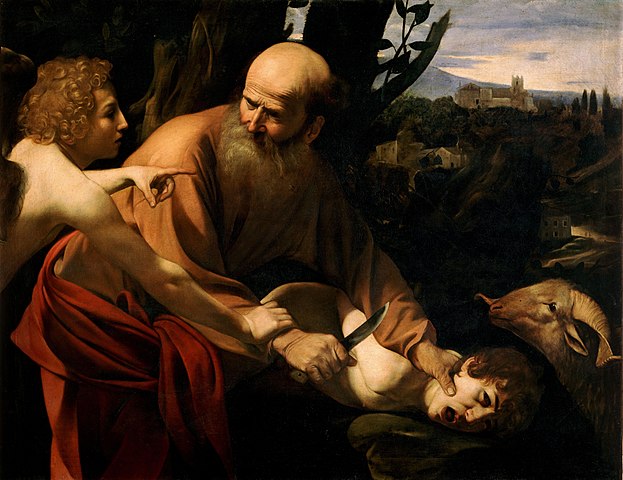Abraham's Temptation: only a matter of Faith, or also of Hope?
1
vote
1
answer
373
views
 Caravaggio: *The Sacrifice of Isaac* (1603)
In Genesis 22 we read that God tested (or "put to the test", or "tempted" - the Hebrew verb **נָסָה** [*nacah*] bears all these meanings) Abraham, saying to him: "Take now your son, your only son Isaac, whom you love, and go to the land of Moriah, and offer him there as a burnt offering [**עֹלָה** - *`olah*] on one of the mountains of which I shall tell you." (Gen 22:2 )
In the end, as we all know, God (or "the Lord’s angel") stopped Abraham, and provided a ram "caught in the bushes by its horns" in replacement of Isaac (Gen 22:13 ), and in the end the Lord (or "the Lord’s angel") praised Abraham "because you have done this and have not withheld your son, your only son" and renewed His promise to make hism "the father of a multitude of nations". (Gen 22:15-18 )
In the *Letter to the Hebrews*, Abraham stands out in the hall of fame of *People Commended for Their Faith*:
> 17 By faith Abraham, when he was tested, offered up Isaac.
> He had received the promises, yet he was ready to offer up his only
> son. 18 God had told him, “Through Isaac descendants will
> carry on your name,” 19 and he reasoned that God could even
> raise him from the dead, and in a sense he received him back from
> there. (Heb 11:17-19 ).
Paul, in his Letter to the Romans, seems to affirm that Abraham's justification is **through his faith only**:
> “Abraham believed God, and it was credited to him as righteousness.”
> (Rom 4:3 ; quot. from Gen 15:6 )
Then Paul, though, only few verses on in the same passage, affirms:
> Against **hope** Abraham [he] believed in **hope** with the result that he
> became *the father of many nations* Gen 17:5 according to the
> pronouncement, “*so will your descendants be* [as numerous as the
> stars in the sky - [Gen 15:5\]][9] .” (Rom 4:18 )
Based on this verse, the expression "to hope against hope " has become a common idiom, meaning something like "to continue to hope for something even though it seems unlikely to happen".
The original Greek expression translated by NET (and similarly by others) "Against hope [he] believed in hope", is παρ’ἐλπίδα ἐπ’ἐλπίδι ἐπίστευσεν (lit. "beyond hope, upon hope [he] believed"). "Against" is an improper translation of παρά.
**Was Abraham's hope something ultimately irrational? What did Abraham believe? What did he hope for?**
Is faith really enough to explain Abraham's behaviour, or is it necessary to consider at least another "ingredient": hope?
------------------------------------------------------------------------
Caravaggio: *The Sacrifice of Isaac* (1603)
In Genesis 22 we read that God tested (or "put to the test", or "tempted" - the Hebrew verb **נָסָה** [*nacah*] bears all these meanings) Abraham, saying to him: "Take now your son, your only son Isaac, whom you love, and go to the land of Moriah, and offer him there as a burnt offering [**עֹלָה** - *`olah*] on one of the mountains of which I shall tell you." (Gen 22:2 )
In the end, as we all know, God (or "the Lord’s angel") stopped Abraham, and provided a ram "caught in the bushes by its horns" in replacement of Isaac (Gen 22:13 ), and in the end the Lord (or "the Lord’s angel") praised Abraham "because you have done this and have not withheld your son, your only son" and renewed His promise to make hism "the father of a multitude of nations". (Gen 22:15-18 )
In the *Letter to the Hebrews*, Abraham stands out in the hall of fame of *People Commended for Their Faith*:
> 17 By faith Abraham, when he was tested, offered up Isaac.
> He had received the promises, yet he was ready to offer up his only
> son. 18 God had told him, “Through Isaac descendants will
> carry on your name,” 19 and he reasoned that God could even
> raise him from the dead, and in a sense he received him back from
> there. (Heb 11:17-19 ).
Paul, in his Letter to the Romans, seems to affirm that Abraham's justification is **through his faith only**:
> “Abraham believed God, and it was credited to him as righteousness.”
> (Rom 4:3 ; quot. from Gen 15:6 )
Then Paul, though, only few verses on in the same passage, affirms:
> Against **hope** Abraham [he] believed in **hope** with the result that he
> became *the father of many nations* Gen 17:5 according to the
> pronouncement, “*so will your descendants be* [as numerous as the
> stars in the sky - [Gen 15:5\]][9] .” (Rom 4:18 )
Based on this verse, the expression "to hope against hope " has become a common idiom, meaning something like "to continue to hope for something even though it seems unlikely to happen".
The original Greek expression translated by NET (and similarly by others) "Against hope [he] believed in hope", is παρ’ἐλπίδα ἐπ’ἐλπίδι ἐπίστευσεν (lit. "beyond hope, upon hope [he] believed"). "Against" is an improper translation of παρά.
**Was Abraham's hope something ultimately irrational? What did Abraham believe? What did he hope for?**
Is faith really enough to explain Abraham's behaviour, or is it necessary to consider at least another "ingredient": hope?
------------------------------------------------------------------------
Asked by Miguel de Servet
(514 rep)
May 20, 2021, 10:40 AM
Last activity: Jun 14, 2021, 01:26 PM
Last activity: Jun 14, 2021, 01:26 PM